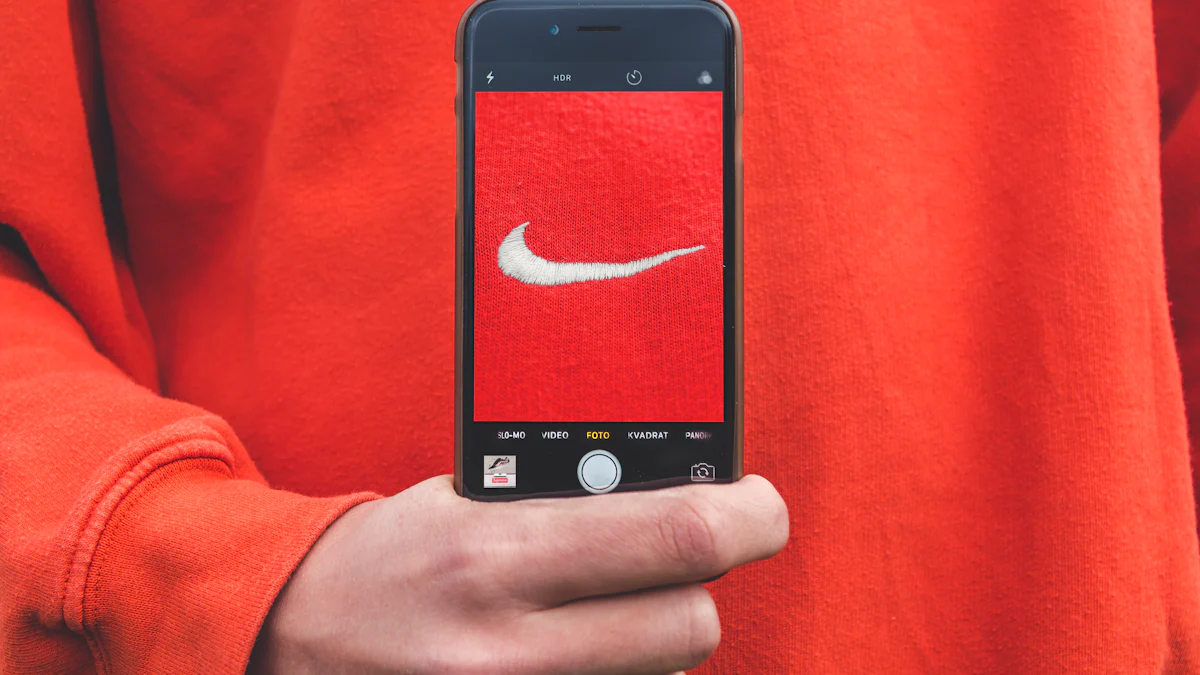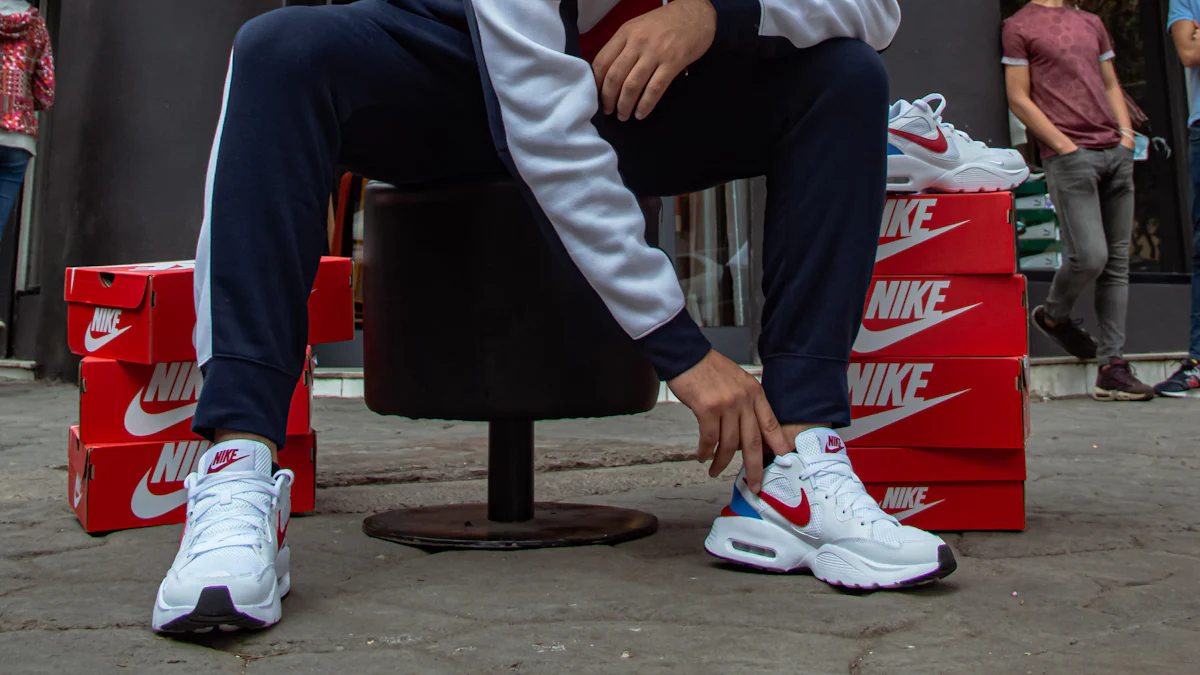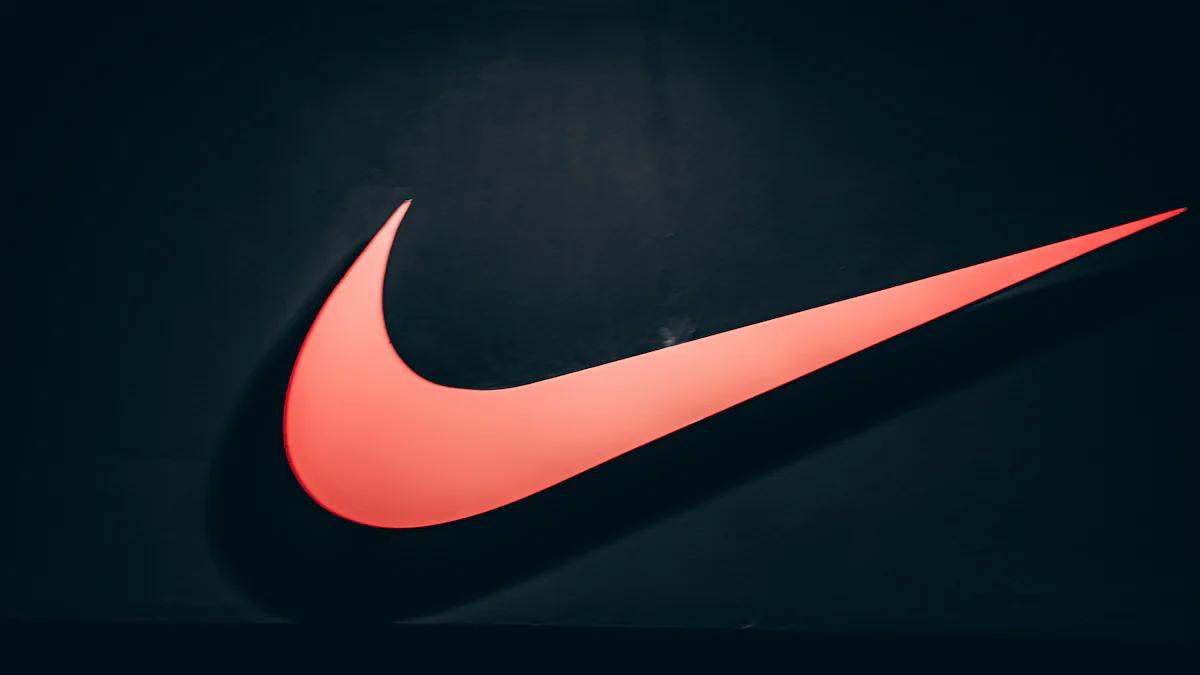Nike Influencer Marketing That Changed the Game

Nike has revolutionized marketing by harnessing the power of nike influencer marketing partnerships. Through bold strategies and compelling stories, Nike connects with audiences on a personal level. For example, between 2012 and 2017, Nike invested over $3 billion in nike influencer marketing, showcasing its commitment to this approach. By crafting relatable narratives, Nike humanizes its brand and fosters emotional connections. Campaigns like "Nike: A Feel for Every You" highlight diversity and inclusivity, ensuring everyone feels represented. These efforts not only redefine marketing but also inspire cultural change, proving that Nike's storytelling resonates globally.
Michael Jordan and the Air Jordan Legacy

The Birth of a Phenomenon
Nike's partnership with Michael Jordan in the 1980s.
You might not realize it, but Nike's collaboration with Michael Jordan in the 1980s changed the way brands and athletes worked together. At the time, Jordan was a rising basketball star with unmatched talent and a competitive spirit that captivated fans worldwide. Nike saw an opportunity to create something unique. This partnership led to the launch of the Nike Air Jordan sneaker line, which quickly became a sensation.
The success of this collaboration wasn’t just about the shoes. It was about the story behind them. Jordan’s on-court excellence made him a global icon, and the sneakers became a symbol of his greatness. Limited-edition releases added to their appeal, creating a sense of exclusivity. This strategy sparked a thriving secondary market, where collectors and fans eagerly sought rare pairs.
How Air Jordan became a cultural and marketing icon.
The Air Jordan brand didn’t stop at sports. It became a cultural phenomenon. You’ve probably seen Air Jordans in movies, TV shows, and music videos. They transitioned from being just basketball shoes to a staple in streetwear and pop culture. Hip-hop artists and celebrities embraced them, solidifying their status as a fashion statement. This blend of athletic performance and style set a new standard in marketing, making Air Jordans a symbol of self-expression and status.
Redefining Athlete Endorsements
The campaign's influence on sneaker culture and brand loyalty.
Nike’s Air Jordan campaigns reshaped sneaker culture. These sneakers weren’t just functional; they were fashionable. People began to see them as a way to express their individuality. The campaigns also built strong brand loyalty. Fans didn’t just buy the shoes—they bought into the story of greatness and determination that Jordan represented.
The rise of sneaker culture owes much to Air Jordans. Limited-edition releases and collaborations created excitement and demand. Owning a pair became a way to stand out, and the resale market for rare models flourished. This phenomenon showed how a product could transcend its original purpose and become a cultural icon.
Long-term impact on sports marketing strategies.
The Air Jordan campaigns didn’t just sell shoes; they changed sports marketing forever. They showed that athletes could be more than endorsers—they could be partners in shaping a brand’s identity. This shift encouraged other athletes to pursue similar collaborations, transforming the way brands approached endorsements.
Nike’s strategy also integrated cultural and social narratives into its campaigns. By connecting with consumers on a deeper level, the brand set a precedent for future marketing efforts. Today, you see this influence in how brands use storytelling to engage audiences and build loyalty.
Serena Williams and Empowerment in Nike Marketing Campaigns
Breaking Barriers Through Campaigns
Serena as a symbol of strength and resilience in Nike's messaging.
Serena Williams represents strength and resilience in Nike's marketing. Her journey in tennis, a sport historically dominated by white athletes, showcases her ability to overcome barriers. Nike highlights her story to inspire you to push past challenges. Through campaigns, Serena’s achievements remind you that success comes from determination and self-belief.
Nike’s campaigns with Serena focus on her breaking barriers in sports and society. They emphasize her resilience against racial and gender-based challenges. This storytelling approach resonates with audiences who value diversity and empowerment. By sharing her journey, Nike connects with you on a deeper level, showing that greatness is achievable regardless of obstacles.
Campaigns like 'Until We All Win' and their cultural significance.
The 'Until We All Win' campaign celebrates Serena’s role as a trailblazer. It promotes equality and inclusion, encouraging you to believe in a fairer future. This campaign aligns with Nike: equality, a broader initiative advocating for social justice. It reminds you that sports can unite people and drive meaningful change.
Nike uses Serena’s influence to challenge societal norms. Campaigns like this inspire you to dream bigger and break stereotypes. They show that sports are not just about competition but also about creating a more inclusive world. Serena’s presence in these campaigns makes the message even more powerful.
Inspiring Inclusivity and Diversity
How Serena's campaigns promoted inclusivity in sports.
Serena’s campaigns with Nike promote inclusivity in sports. They challenge outdated perceptions and encourage you to embrace diversity. For example:
- 68% of Serena’s fans believe sports need to be more inclusive, compared to 57% of all sports fans.
- 45% of her fans disagree that women’s sports are less exciting than men’s, compared to 29% of all sports fans.
- 84% of her fans think men and women are still not treated equally in the workplace, versus 70% of all sports fans.
These statistics show how Serena’s influence inspires you to view sports as a platform for equality.
The role of storytelling in connecting with diverse audiences.
Nike uses storytelling to connect with diverse audiences through Serena’s campaigns. The 'Dream Crazier' campaign, narrated by Serena, celebrates female athletes’ achievements while addressing discrimination. It encourages you to pursue your dreams without fear of societal limitations.
This campaign also features athletes like Simone Biles and Sue Bird, showing that women can excel in any sport. By sharing meaningful stories, Nike inspires you to believe in equal opportunities. Serena’s journey highlights the importance of resilience and individuality, making the message relatable and impactful.
Colin Kaepernick and the 'Dream Crazy' Campaign

A Bold Stand in Influencer Marketing
Nike's decision to feature Kaepernick amidst controversy.
Nike’s decision to feature Colin Kaepernick in the 'Dream Crazy' campaign marked a pivotal moment in influencer marketing. Kaepernick, known for kneeling during the national anthem to protest racial injustice, became a polarizing figure. By choosing him as the face of the campaign, Nike took a significant risk. Some customers felt alienated by his controversial status, leading to public backlash and calls for boycotts. However, this bold move resonated strongly with younger, socially conscious audiences who valued the brand’s commitment to standing for justice.
The campaign generated immense attention. Within a week, Nike received 2.7 million mentions across social media. It also delivered $43 million in media exposure within 24 hours and achieved over 21 million YouTube views in the same week. This response demonstrated the power of aligning marketing with social causes, even in the face of controversy.
The powerful message of 'Believe in something. Even if it means sacrificing everything.'
The campaign’s tagline, “Believe in something. Even if it means sacrificing everything,” became a rallying cry for activism. While some criticized the message, others found it deeply inspiring. It highlighted the importance of standing firm in your beliefs, regardless of the consequences. Public reactions were divided, with notable figures like President Trump expressing outrage. Despite this polarization, Nike’s sales surged, proving the message resonated with a significant portion of its audience.
This campaign showed how influencer marketing could transcend product promotion. It became a platform for sparking meaningful conversations about social justice and perseverance.
Cultural and Financial Impact
How the campaign sparked global conversations on activism.
The 'Dream Crazy' campaign ignited discussions about the role of brands in addressing social issues. It emphasized the importance of perseverance and standing up for your beliefs. The campaign also highlighted diverse female athletes, fueling conversations about race, equality, and representation. Globally, it united people across gender, race, and backgrounds, encouraging them to pursue common goals.
This campaign became a rallying cry for progress and empowerment. It inspired individuals, particularly women, to challenge societal norms and demand equality. By addressing these issues, Nike positioned itself as more than a sportswear company—it became a catalyst for change.
The effect on Nike's brand image and sales.
Nike’s strategy paid off both culturally and financially. The campaign generated over 5 billion media impressions and pushed Nike’s stock price to an all-time high. Younger consumers appreciated the brand’s support for social justice, which positively shifted public perception. Online sales grew by 31% within a week, compared to a 17% gain during the same period in 2017.
These results showcased the effectiveness of Nike advertising strategy in increasing brand awareness. By aligning with social causes, Nike not only strengthened its brand image but also achieved remarkable financial success. This campaign set a new standard for influencer marketing, proving that bold messaging can drive both cultural impact and profitability.
Cristiano Ronaldo and Global Digital Influence
Expanding Nike's Global Reach
Nike's collaboration with Ronaldo to target international markets.
When Nike partnered with Cristiano Ronaldo, it unlocked a new level of global influence. Ronaldo’s personal story of rising from humble beginnings to becoming a football legend resonates with fans worldwide. By weaving his journey into its messaging, Nike created campaigns that inspire and connect with audiences across cultures. His charisma and success made him the perfect ambassador to represent Nike’s excellence in football.
Ronaldo’s massive social media following, with over 642 million Instagram followers, allows Nike to reach audiences in ways traditional advertising cannot. This partnership has helped Nike tap into the universal love of soccer, making the brand relatable to fans who see Ronaldo as more than just a player. In 2016, Nike secured a lifetime deal with Ronaldo, reportedly worth $1 billion, solidifying his role as a key figure in its global marketing strategy.
Campaigns like 'CR7' and their global appeal.
The 'CR7' campaigns showcase Ronaldo’s influence on Nike’s global reach. These campaigns highlight his athleticism and style, appealing to millions of young fans who admire his dedication and success. Ronaldo’s collaborations with other brands, such as Louis Vuitton and Emirates Airlines, further amplify his global appeal. However, his long-term partnership with Nike remains one of the most impactful, driving product sales and strengthening the brand’s presence in international markets.
Leveraging Digital Platforms
How Ronaldo's campaigns utilized social media for engagement.
Ronaldo’s social media platforms play a crucial role in Nike’s digital marketing campaigns. His posts reach millions of followers, creating instant engagement. For example, his Instagram account alone boasts over 642 million followers, making it a powerful tool for promoting Nike products. By sharing campaign content, Ronaldo bridges the gap between the brand and its audience, fostering a sense of connection and loyalty.
The measurable success in terms of reach and sales.
Nike’s collaboration with Ronaldo has delivered measurable success. His social media presence drives traffic to Nike’s platforms, boosting visibility and sales. For instance, Nike’s online sales surged during the launch of Ronaldo-focused campaigns. These results highlight the effectiveness of leveraging a global icon in Nike digital marketing campaigns. Ronaldo’s influence proves that aligning with the right ambassador can elevate a brand’s reach and profitability.
Naomi Osaka and the Evolution of Influencer Marketing
Connecting with a New Generation
Nike's partnership with Osaka to appeal to younger audiences.
Nike’s partnership with Naomi Osaka has created a strong connection with younger audiences. Her authenticity and activism resonate with a generation that values inclusivity and resilience. By aligning her personal values with Nike’s, Osaka has become a relatable figure for young people. Her focus on mental health and social justice has made her a role model for those who seek meaningful stories in influencer marketing.
Osaka’s appeal continues to grow as she balances her tennis career with her role as an influencer. Her journey inspires young fans to pursue their passions while staying true to themselves. Nike’s campaigns with Osaka emphasize individuality, showing that success comes from embracing your unique identity. This approach has strengthened Nike’s bond with a younger audience, making the brand more relevant in today’s cultural landscape.
Campaigns that emphasized mental health and individuality.
Nike’s campaigns with Osaka highlight the importance of mental health and individuality. These campaigns encourage you to prioritize your well-being and embrace your personal journey. Osaka’s openness about her struggles with mental health has sparked important conversations, making her a powerful advocate for change.
Through these campaigns, Nike demonstrates its commitment to supporting athletes as whole individuals, not just competitors. This focus on mental health aligns with the values of a younger audience, who appreciate brands that address real-life challenges. By sharing Osaka’s story, Nike inspires you to see strength in vulnerability and individuality.
Authenticity and Social Advocacy
How Osaka's campaigns reflect a shift toward authenticity.
Osaka’s campaigns with Nike represent a shift toward authenticity in influencer marketing. Her partnership with brands like TAG Heuer highlights her advocacy for mental health, connecting with audiences who value genuine relationships. These campaigns balance product promotion with meaningful advocacy, showing that authenticity matters in marketing.
Younger audiences seek brands that reflect their values, and Osaka’s collaborations deliver on this expectation. Her ability to connect with fans through her stories makes her a standout influencer. Nike’s approach to working with Osaka demonstrates the power of authenticity in building trust and loyalty.
The role of athletes as advocates for social change.
Osaka’s role as an advocate for social change has elevated Nike’s campaigns to new heights. Together, they launched a coaching program in Japan to address gender disparities in sports. This initiative empowers girls and breaks down cultural barriers, showing the transformative power of sports.
Osaka emphasizes the importance of great coaches in shaping young lives. Her efforts inspire you to see sports as a platform for equality and empowerment. By partnering with Osaka, Nike reinforces its commitment to creating a more inclusive world. This collaboration proves that athletes can drive meaningful change beyond their sport.
Nike's influencer marketing campaigns have redefined how brands connect with audiences. By transitioning from a focus on athletic performance to embracing lifestyle and fashion, Nike has broadened its appeal. These campaigns, like those featuring Michael Jordan and Naomi Osaka, combine storytelling with cultural relevance, inspiring you to see sports as a platform for change.
Nike’s ability to adapt and innovate keeps it ahead of competitors. The company uses in-depth research to explore new markets and leverages digital platforms to engage diverse demographics. Its bold messaging, exemplified by the Colin Kaepernick campaign, resonates with your desire for self-improvement and authenticity.
These campaigns not only drive sales but also shape cultural narratives. For example, the "Just Do It" campaign increased sales from $877 million to $9.2 billion in a decade. Nike’s commitment to inclusivity and sustainability fosters loyalty, proving that influencer marketing can achieve both financial success and social impact.
FAQ
What makes Nike’s influencer marketing campaigns so successful?
Nike’s campaigns succeed because they combine storytelling, cultural relevance, and bold messaging. By partnering with influential athletes, Nike creates emotional connections with you. These campaigns inspire you to see sports as a platform for change, making the brand relatable and aspirational.
How does Nike choose its influencers?
Nike selects influencers based on their authenticity, global appeal, and alignment with the brand’s values. Athletes like Serena Williams and Cristiano Ronaldo represent resilience and excellence. This strategy ensures that Nike’s campaigns resonate with you and inspire you to connect with the brand.
Why is storytelling important in Nike’s campaigns?
Storytelling helps Nike humanize its brand. By sharing athletes’ journeys, Nike inspires you to overcome challenges and pursue your dreams. Stories like Michael Jordan’s rise to greatness or Naomi Osaka’s mental health advocacy make the campaigns relatable and impactful.
How do Nike’s campaigns impact social issues?
Nike uses its campaigns to address social issues like equality, diversity, and mental health. For example, the 'Dream Crazy' campaign with Colin Kaepernick sparked conversations about activism. These efforts show you that brands can drive meaningful change while promoting their products.
What role does digital marketing play in Nike’s strategy?
Digital marketing amplifies Nike’s campaigns by reaching you through social media and online platforms. Influencers like Cristiano Ronaldo use their massive followings to promote Nike products. This approach increases engagement, boosts sales, and strengthens the brand’s global presence.
See Also
Understanding TikTok Influencer Marketing And Its Functionality
Key Influencer Marketing Trends To Follow In 2024
Excelling In TikTok Influencer Marketing Tactics For 2024
Best Influencer Marketing Platforms For Online Retail Growth
